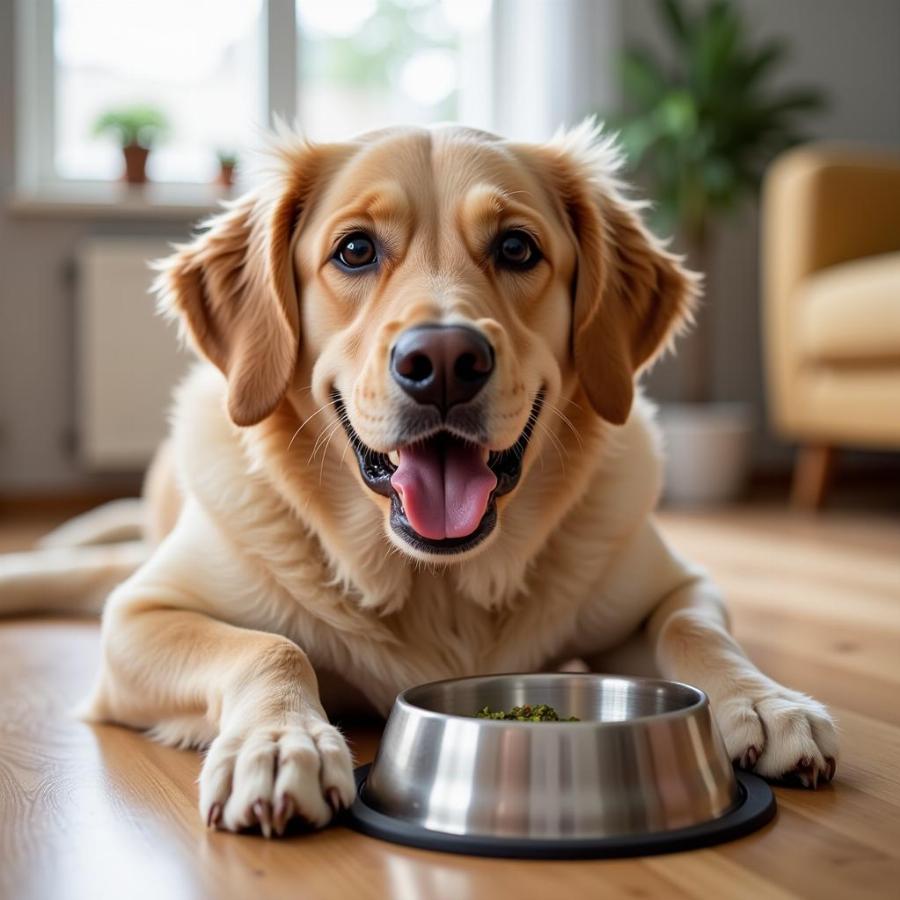Norcan, a popular flea and tick preventative for dogs, has raised some concerns among pet owners regarding potential weight gain. While Norcan itself doesn’t directly cause weight gain, some factors related to its use could contribute to changes in your dog’s weight. Understanding these factors is key to ensuring your furry friend stays healthy and at their ideal weight. Let’s delve into the details and separate fact from fiction.
Understanding Norcan and its Effects
Norcan is an effective medication containing pyriproxyfen and imidacloprid, designed to protect dogs from fleas and ticks. It works by disrupting the flea and tick life cycle, preventing infestations and the transmission of diseases they carry. The medication itself doesn’t contain any ingredients known to directly cause weight gain in dogs. However, some pet owners have observed changes in their dog’s appetite or activity levels after starting Norcan, which can indirectly influence weight.
Does Norcan Increase Appetite?
While not a common side effect, some dogs may experience a temporary increase in appetite after starting Norcan. This could be due to a reduction in the discomfort and irritation caused by flea and tick bites. When a dog is constantly itching and biting at their skin, they may expend more energy and experience a suppressed appetite. Once the fleas and ticks are eliminated, the dog’s discomfort subsides, and their normal appetite may return, or even increase slightly. This increased appetite, if not managed properly, can lead to weight gain.
 Dog Eating After Norcan Treatment
Dog Eating After Norcan Treatment
Can Norcan Affect Activity Levels?
Similar to the appetite changes, relief from flea and tick irritation can also lead to increased activity levels in some dogs. Constant itching and discomfort can make a dog lethargic and reluctant to move. After starting Norcan, as the irritation subsides, the dog may become more energetic and playful. However, in some cases, particularly if the dog was previously very active despite the irritation, the elimination of the discomfort might not lead to a noticeable increase in activity. This could lead to a slight imbalance between calories consumed and calories burned, potentially contributing to weight gain.
Managing Your Dog’s Weight While Using Norcan
Maintaining a healthy weight for your dog is crucial, regardless of whether they’re on flea and tick prevention. Here are some tips to manage your dog’s weight while using Norcan:
- Monitor Food Intake: Pay close attention to your dog’s food intake and adjust portions as needed. If you notice an increase in appetite, consult your veterinarian to determine the appropriate portion size.
- Regular Exercise: Ensure your dog gets regular exercise appropriate for their breed and age. This helps burn calories and maintain a healthy weight.
- Choose a Balanced Diet: Feed your dog a high-quality, balanced diet that meets their nutritional needs.
- Regular Vet Checkups: Schedule regular checkups with your veterinarian to monitor your dog’s overall health and weight.
Can Norcan Cause Weight Loss in Dogs?
While weight gain is a more common concern, in some rare cases, dogs might experience a slight decrease in appetite after starting Norcan. This can be attributed to individual sensitivities or temporary digestive upset. However, this is typically temporary and resolves on its own. If you notice significant weight loss or a persistent decrease in appetite, consult your veterinarian.
What to Do If You Suspect Norcan is Affecting Your Dog’s Weight
If you notice any significant changes in your dog’s weight or appetite after starting Norcan, the best course of action is to consult with your veterinarian. They can help determine the underlying cause of the weight change and advise you on the best way to manage it.
FAQs
- Does Norcan contain steroids that can cause weight gain? No, Norcan does not contain steroids.
- Is weight gain a common side effect of Norcan? No, weight gain is not a direct side effect of Norcan.
- Should I stop using Norcan if my dog gains weight? Consult your vet before stopping any medication.
- What are the common side effects of Norcan? Common side effects include skin reactions at the application site.
- How often should I apply Norcan? Typically, Norcan is applied monthly, but always follow your vet’s instructions.
- Can I use Norcan on puppies? Consult your veterinarian for guidance on using Norcan on puppies.
- Are there alternative flea and tick preventatives? Yes, there are other flea and tick prevention options available. Discuss these with your vet.
Further Reading
- Learn more about flea and tick prevention for dogs.
- Explore different dog breeds and their specific needs.
- Discover tips for maintaining your dog’s overall health.
Conclusion
While Norcan itself doesn’t directly cause weight gain in dogs, changes in appetite and activity levels related to relief from flea and tick irritation can indirectly contribute to weight fluctuations. Monitoring your dog’s food intake, providing regular exercise, and consulting with your veterinarian are essential for maintaining a healthy weight for your furry companion while using Norcan.
Beaut Dogs
Beaut Dogs is your trusted resource for all things related to dog care, offering expert advice and practical tips to help you provide the best possible care for your canine companion. From breed information to health and nutrition guidance, we’re here to support you on your journey as a dog owner. For personalized advice and answers to your specific questions, contact us at [email protected]. Visit us at https://beautdogs.com for more information.